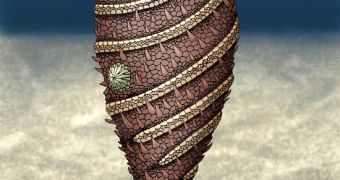Some 520 million years ago, planet Earth was home to a creature that looked oddly similar to a cigar. Remains of this creature were unearthed in Morocco back in 2012, but the specialists who found them are just now sharing information concerning this weird species.
In an article published in June 25's issue of the journal Proceedings of the Royal Society B, the researchers explain that, as the fossil remains they have found and analyzed indicate, the creature was a primitive echinoderm.
The scientists suspect that this ancient animal was able to change the form of its body whenever circumstances called for it.
They say that it was able to either expand its “waistline” or shrink it. Whenever it did so, the creature also altered its length.
“It's a cigar-shaped beast, and it was able to expand and contract that cigar shape. Sometimes it could be short and fat, and sometimes it could be long and thin,” researcher Andrew Smith said, as cited by Live Science.
Whenever it chose to be slender, the creature could measure up to 1.6 inches (4 centimeters) in length.
The echinoderm managed to change its body shape with the help of five ambulacra (i.e. radiating surface areas).
This means that it had fivefold symmetry, and that its anatomical makeup could shed new light on how the echinoderms presently roaming our planet evolved.
“[It] has characteristics that place it as the most primitive echinoderm that has fivefold symmetry,” Andrew Smith stressed.
The creature's mouth was located on the top of its body, and its skeleton was made from calcite.
The same source informs us that this newly documented species, which paleontologists decided to name Helicocystis moroccoensis, lived during the Cambrian Explosion.
During this period in our planet's history, both sea and land biodiversity underwent drastic changes and greatly diversified.
Helicocystis moroccoensis inhabited the ancient supercontinent of Gondwana.

 14 DAY TRIAL //
14 DAY TRIAL //